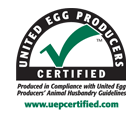 What’s important is keeping the birds happy. Happy birds produce better eggs and more of them… right? Right or wrong, the United Egg Producers say, either way, free-range birds aren’t necessarily “happier.”
What’s important is keeping the birds happy. Happy birds produce better eggs and more of them… right? Right or wrong, the United Egg Producers say, either way, free-range birds aren’t necessarily “happier.”
Animal rights activists have long alleged that hens in modern cages live a horribly stressed life, but new research appears to debunk those claims. Researchers have discovered that free range hens experience just as much or more stress than hens raised in modern, conventional cages.
A recent study conducted by Dr. Jeff Downing at University of Sydney measured corticosterone, a hormone produced in response to stress or fear, in eggs from free range and modern caged hens. The study showed that the levels of the hormone were similar in both types of eggs.
“This study confirms what America’s egg farmers already knew,” said Gene Gregory, president of the United Egg Producers, the nation’s leading trade association for U.S. family egg farmers. “That well-run, clean modern cage housing systems have many benefits for hens as well as consumers.” Separate research studies also show that hens raised in conventional cages tend to have fewer diseases and live longer, Gregory added.
Free range hens deal with pressures that hens in modern cages do not, researchers explained. For instance, hens in modern cages are protected from outside predators, while free range hens are not. “They are constantly in fear of attack by predators,” said Downing. “A shadow (a bird flying overhead) comes over and they are completely startled.”
Hens in modern cages also are protected from many of the manure-borne diseases and parasites that affect free range hens. And hens in modern cages are protected from extreme weather which adds stress to free range hens which are not protected. Modern cages also help prevent infection and spread of the avian influenza virus which can affect wild birds and outdoor flocks of hens. Free range eggs can cost up to three times as much as conventional eggs.
Modern egg production under the UEP Certified animal welfare program provides hens with nutritious food, clean water, fresh air and sufficient space to allow hens to stand, turn around, lie down, stretch and preen. Farms are inspected annually to ensure compliance. Consumers should look for the UEP Certified logo on cartons from participating farmers.

